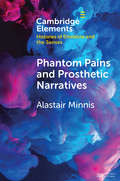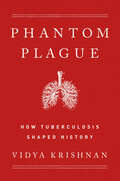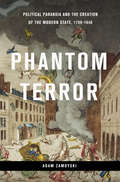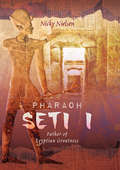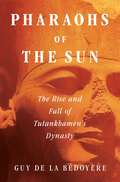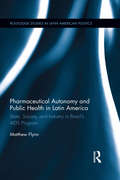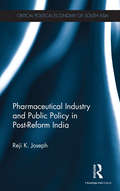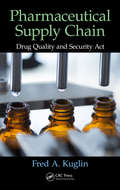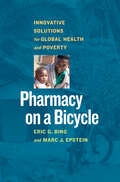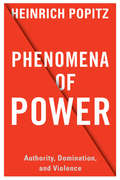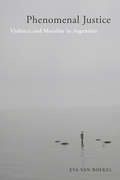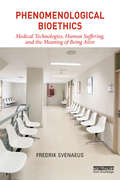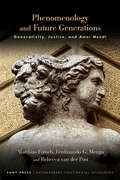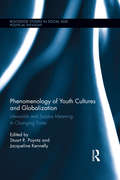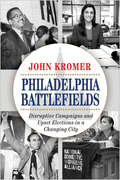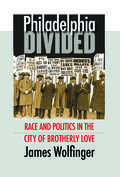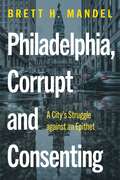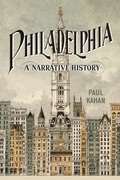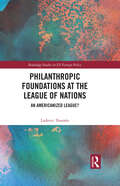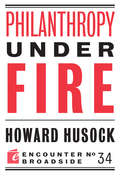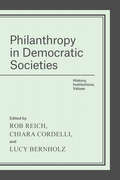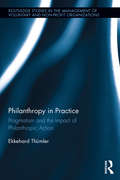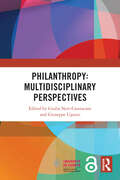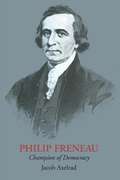- Table View
- List View
Phantom Pains and Prosthetic Narratives: From George Dedlow to Dante (Elements in Histories of Emotions and the Senses)
by Alastair Minnis'Phantom limb pain' designates the sensations which seem to emanate from limbs that in reality are missing. The phrase was coined by the American Civil War surgeon, Weir Mitchell, in reference to his fictional amputee, George Dedlow. Contemporary neuroscience holds that the brain encloses a schema which covers the whole body, and asserts its unity even if certain parts are missing. Reading backwards from Dedlow's sufferings, Alastair Minnis traces the medieval precedents and parallels, focusing on Augustine and Dante, who subscribed to the notion of a 'body in the soul'. Dante's souls in purgatory self-prosthesize with aerial phantoms as they long for the full embodiment which only the resurrection can bring. Is a complete body necessary for personhood? And how can the gamut of human feelings be run if parts or the entirety of one's body does not exist? Combining medieval studies and contemporary neuroscience, this absorbing study explores the fascinating and surprising history of phantom pain.
Phantom Plague: How Tuberculosis Shaped History
by Vidya KrishnanHarvard Public Health Magazine, Best Public Health Books and Journalism of 2022The definitive social history of tuberculosis, from its origins as a haunting mystery to its modern reemergence that now threatens populations around the world. It killed novelist George Orwell, Eleanor Roosevelt, and millions of others – rich and poor. Desmond Tutu, Amitabh Bachchan, and Nelson Mandela survived it, just. For centuries, tuberculosis has ravaged cities and plagued the human body. In Phantom Plague, Vidya Krishnan, traces the history of tuberculosis from the slums of 19th-century New York to modern Mumbai. In a narrative spanning century, Krishnan shows how superstition and folk-remedies, made way for scientific understanding of TB, such that it was controlled and cured in the West. The cure was never available to black and brown nations. And the tuberculosis bacillus showed a remarkable ability to adapt – so that at the very moment it could have been extinguished as a threat to humanity, it found a way back, aided by authoritarian government, toxic kindness of philanthropists, science denialism and medical apartheid. Krishnan&’s original reporting paints a granular portrait of the post-antibiotic era as a new, aggressive, drug resistant strain of TB takes over. Phantom Plague is an urgent, riveting and fascinating narrative that deftly exposes the weakest links in our battle against this ancient foe.
Phantom Terror: Political Paranoia and the Creation of the Modern State, 1789-1848
by Adam ZamoyskiAfter the French Revolution, conservative governments from Britain to Russia created bulwarks to protect their power against the threat of further rebellions. They repressed and spied on their citizens, policing both speech and actions. In nations across Europe, politicians and cultural leaders from Edmund Burke to Mary Shelley chose sides, either propelling or resisting the counter-revolutionary spirit embodied in these omnipotent central states. These years of paranoia not only witnessed the first stirrings of modern totalitarian regimes, but gave birth to the political contest between the privileged and the underprivileged--a legacy that haunts us to this day. In Phantom Terror, award-winning historian Adam Zamoyski reveals that the years after the French Revolution were the crux upon which the rest of European history would turn--a moment when desperate monarchs took the world down the path of revolution, terror, and world war.
Pharaoh Seti I: Father of Egyptian Greatness
by Nicky NielsenPharaoh Seti I ruled Egypt for only 11 years (1290-1279 BC), but his reign marked a revival of Egyptian military and economic power, as well as cultural and religious life. Seti was born the son of a military officer in northern Egypt, far from the halls of power in Memphis and Thebes. However, when the last king of the 18th Dynasty, Horemheb, died without an heir, Setis father was named king. He ruled for only two years before dying of old age, leaving Seti in charge of an ailing superpower. Seti set about rebuilding Egypt after a century of dynastic struggles and religious unrest. He reasserted Egypts might with a series of campaigns across the Levant, Libya and Nubia. He despatched expeditions to mine for copper, gold, and quarry for stone in the deserts, laying the foundations for one of the most ambitious building projects of any Egyptian Pharaoh and his actions allowed his son, Ramesses the Great to rule in relative peace and stability for 69 years, building on the legacy of his father.
Pharaohs of the Sun: The Rise and Fall of Tutankhamun's Dynasty
by Guy de la BédoyèreA vivid story of an astonishing period in ancient Egypt&’s history—1550 BC to 1295 BC—that tears away the gold and glamour to reveal how these great pharaohs ruthlessly ruled Egypt for two hundred and fifty years. For more than two centuries, Egypt was ruled by the most powerful, successful, and richest dynasty of kings in its long end epic history. They included the female king Hatshepsut, the warrior kings Thutmose III and Amenhotep II, the religious radical Akhenaten and his queen, Nefertiti, and most famously of all—for the wealth found in his tomb—the short-lived boy king, Tutankhamun. The power and riches of the Pharaohs of the 18th Dynasty came at enormous cost to Egypt's enemies—and to most of its people. This was an age of ruthless absolutism, exploitation, extravagance, brutality, and oppression in a culture where not only did Egypt plunder its neighbors, but Egyptian kings (and their people) robbed one another. 3,500 years ago, ancient Egypt began two centuries of growth where it became richer and more powerful than any other nation in the world, ruled by the kings of the 18th Dynasty. They presided over a system built on war, oppression, and ruthlessness, pouring Egypt's wealth into grandiose monuments, temples, and extravagant tombs. Tutankhamun was one of the last of the line—and one of the most obscure. Among his predecessors were some of the most notorious and enigmatic figures of all of Egypt's history. Pharaohs of the Sun is the story of these famed rulers, showing how their glamour and gold became tainted by selfishness, ostentation, and the systematic exploitation of Egypt's people and enemies.
Pharmaceutical Autonomy and Public Health in Latin America: State, Society and Industry in Brazil’s AIDS Program (Routledge Studies in Latin American Politics #11)
by Matthew B. FlynnBrazil has occupied a central role in the access to medicines movement, especially with respect to drugs used to treat those with the human immunodeficiency virus (HIV) that causes the acquired immune deficiency syndrome (AIDS). How and why Brazil succeeded in overcoming powerful political and economic interests, both at home and abroad, to roll-out and sustain treatment represents an intellectual puzzle. In this book, Matthew Flynn traces the numerous challenges Brazil faced in its efforts to provide essential medicines to all of its citizens. Using dependency theory, state theory, and moral underpinnings of markets, Flynn delves deeper into the salient factors contributing to Brazil’s successes and weaknesses, including control over technology, creation of political alliances, and instrumental use of normative frameworks and effectively explains the ability of countries to fulfill the prescription drug needs of its population versus the interests and operations of the global pharmaceutical industry Pharmaceutical Autonomy and Public Health in Latin America is one of the only books to provide an in-depth account of the challenges that a developing country, like Brazil, faces to fulfill public health objectives amidst increasing global economic integration and new international trade agreements. Scholars interested in public health issues, HIV/AIDS, and human rights, but also to social scientists interested in Latin America and international political economy will find this an original and thought provoking read.
Pharmaceutical Industry and Public Policy in Post-reform India (Critical Political Economy of South Asia)
by Reji K. JosephThis book examines the impact of economic reforms in India on the pharmaceutical industry and access to medicines. It traces the changing production and trade pattern of the industry, research and development (R&D) preferences and strategies of Indian pharmaceutical firms, patent system alongside pricing policy measures and their shortcomings. It also analyses the public health financing system in India driven largely by out-of-pocket expenditure — about 60 per cent — and characterised by very high share of medicines in total health expenditure. A masterful insight into a topical area, the work will be indispensable to those working on pharmaceutical industry and public policy. It will be of interest to researchers, scholars, students, and policy-makers of economics, industrial policy, public policy, intellectual property rights and health financing.
Pharmaceutical Public Policy
by Thomas R. Fulda Alan Lyles Albert I WertheimerAs the most common health-care intervention, prescription drug use shares the most important characteristics of the health-care system in the United States. When everything works well, it makes possible breathtakingly successful applications of science to the prevention and cure of human suffering. But everything doesn‘t always work well. Pharmaceu
Pharmaceutical Supply Chain: Drug Quality and Security Act
by Fred A. KuglinError-proofing in the production process of pharmaceuticals isn‘t just a matter of good business, it has life-and-death implications for consumers. To that end, the 2013 Drug Quality and Security Act in large part requires new mandates on tracking and tracing chain of custody in the supply chain. Pharmaceutical Supply Chain: Drug Quality and Securi
Pharmacy on a Bicycle: Innovative Solutions for Global Health and Poverty
by Marc J. Epstein Eric G. BingEvery four minutes, over 50 children under the age of five die. In the same four minutes, 2 mothers lose their lives in childbirth. Every year, malaria kills nearly 1.2 million people, despite the fact that it can be prevented with a mosquito net and treated for less than $1.50.Sadly, this list goes on and on. Millions are dying from diseases that we can easily and inexpensively prevent, diagnose, and treat. Why? Because even though we know exactly what people need, we just can’t get it to them. They are dying not because we can’t solve a medical problem but because we can’t solve a logistics problem. In this profoundly important book, Eric G. Bing and Marc J. Epstein lay out a solution: a new kind of bottom-up health care that is delivered at the source. We need microclinics, micropharmacies, and microentrepreneurs located in the remote, hard-to-reach communities they serve. By building a new model that “scales down” to train and incentivize all kinds of health-care providers in their own villages and towns, we can create an army of on-site professionals who can prevent tragedy at a fraction of the cost of top-down bureaucratic programs. Bing and Epstein have seen the model work, and they provide example after example of the extraordinary results it has achieved in Africa, Asia, and Latin America. This is a book about taking health care the last mile—sometimes literally—to prevent widespread, unnecessary, and easily avoided death and suffering. Pharmacy on a Bicycle shows how the same forces of innovation and entrepreneurship that work in first-world business cultures can be unleashed to save the lives of millions.
Phenomena of Power: Authority, Domination, and Violence (European Perspectives: A Series in Social Thought and Cultural Criticism)
by Heinrich PopitzIn Phenomena of Power, one of the leading figures of postwar German sociology reflects on the nature, and many forms of, power. For Heinrich Popitz, power is rooted in the human condition and is therefore part of all social relations. Drawing on philosophical anthropology, he identifies the elementary forms of power to provide detailed insight into how individuals gain and perpetuate control over others. Instead of striving for a power-free society, Popitz argues, humanity should try to impose limits on power where possible and establish counterpower where necessary.Phenomena of Power delves into the sociohistorical manifestations of power and breaks through to its general structures. Popitz distinguishes the forms of the enforcement of power as well as of its stabilization and institutionalization, clearly articulating how the mechanisms of power work and how to track them in the social world. Philosophically trained, historically informed, and endowed with keen observation, Popitz uses examples ranging from the way passengers on a ship organize deck chairs to how prisoners of war share property to illustrate his theory. Long influential in German sociology, Phenomena of Power offers a challenging reworking of one of the essential concepts of the social sciences.
Phenomenal Justice: Violence and Morality in Argentina (Genocide, Political Violence, Human Righ)
by Eva van RoekelHow do victims and perpetrators of political violence caught up in a complicated legal battle experience justice on their own terms? Phenomenal Justice is a compelling ethnography about the reopened trials for crimes against humanity committed during the brutal military dictatorship that ruled Argentina between 1976 and 1983. Grounded in phenomenological anthropology and the anthropology of emotion, this book establishes a new theoretical basis that is faithful to the uncertainties of justice and truth in the aftermath of human rights violations. The ethnographic observations and the first-person stories about torture, survival, disappearance, and death reveal the enduring trauma, heartfelt guilt, happiness, battered pride, and scratchy shame that demonstrate the unreserved complexities of truth and justice in post-conflict societies. Phenomenal Justice will be an indispensable contribution to a better understanding of the military dictatorship in Argentina and its aftermath.
Phenomenological Bioethics: Medical Technologies, Human Suffering, and the Meaning of Being Alive
by Fredrik SvenaeusEmerging medical technologies are changing our views on human nature and what it means to be alive, healthy, and leading a good life. Reproductive technologies, genetic diagnosis, organ transplantation, and psychopharmacological drugs all raise existential questions that need to be tackled by way of philosophical analysis. Yet questions regarding the meaning of life have been strangely absent from medical ethics so far. This book brings phenomenology, the main player in the continental tradition of philosophy, to bioethics, and it does so in a comprehensive and clear manner. Starting out by analysing illness as an embodied, contextualized, and narrated experience, the book addresses the role of empathy, dialogue, and interpretation in the encounter between health-care professional and patient. Medical science and emerging technologies are then brought to scrutiny as endeavours that bring enormous possibilities in relieving human suffering but also great risks in transforming our fundamental life views. How are we to understand and deal with attempts to change the predicaments of coming to life and the possibilities of becoming better than well or even, eventually, surviving death? This is the first book to bring the phenomenological tradition, including philosophers such as Martin Heidegger, Edith Stein, Maurice Merleau-Ponty, Jean-Paul Sartre, Hans-Georg Gadamer, Paul Ricoeur, Hans Jonas, and Charles Taylor, to answer such burning questions.
Phenomenology and Future Generations: Generativity, Justice, and Amor Mundi (SUNY series in Contemporary Continental Philosophy)
by Matthias Fritsch, Ferdinando G. Menga and Rebecca van der PostIn the face of widespread environmental and social destabilization and growing uncertainty about the future of humanity, this collection of essays brings the philosophical tradition of phenomenology to the question of relations between generations to examine our ethical, political, and environmental obligations to future people. Emphasizing phenomenology's rich reflections on the role of time in the constitution of the social-historical world and its relation to the environment, the essays interweave the central themes of mortality, natality, generativity, and amor mundi to build vital bridges between new developments in both eco- and critical phenomenology and important work in intergenerational ethics. Together, the chapters reevaluate the traditional scope and foundational concepts of environmental ethics and social justice, paving the way for a revised understanding of intergenerational responsibilities, culminating in the key insight that future people are of us. The result is an invaluable conceptual toolkit for phenomenologists, ethicists, theorists, students, and activists concerned with environmental justice and climate ethics.
Phenomenology of Youth Cultures and Globalization: Lifeworlds and Surplus Meaning in Changing Times (Routledge Studies in Social and Political Thought #99)
by Stuart R. Poyntz Jacqueline KennellyThis edited collection brings together scholars who draw on phenomenological approaches to understand the experiences of young people growing up under contemporary conditions of globalization. Phenomenology is both a philosophical and pragmatic approach to social sciences research, that takes as central the meaning-making experiences of research participants. One of the central contentions of this book is that phenomenology has long informed critical empirical approaches to youth cultures, yet until recently its role has not been thusly named. This volume aims to resuscitate and recuperate phenomenology as a robust empirical, theoretical, and methodological approach to youth cultures. Chapters explore the lifeworlds of young people from countries around the world, revealing the tensions, risks and opportunities that organize youth experiences.
Philadelphia Battlefields: Disruptive Campaigns and Upset Elections in a Changing City
by John KromerShould the surprisingly successful outcomes achieved by outsider candidates in Philadelphia elections be interpreted as representing fundamental changes in the local political environment, or simply as one-off victories, based largely on serendipitous circumstances that advanced individual political careers? John Kromer’s insightful Philadelphia Battlefields considers key local campaigns undertaken from 1951 to 2019 that were extraordinarily successful despite the opposition of the city’s political establishment. Kromer draws on election data and data-mapping tools that explain these upset elections as well as the social, economic, and demographic trends that influenced them to tell the story of why these campaign strategies were successful. He deftly analyzes urban political dynamics through case studies of newcomer Rebecca Rhynhart’s landslide victory over a veteran incumbent for Philadelphia City Controller; activist Chaka Fattah’s effective use of grassroots organizing skills to win a seat in Congress; and Maria Quiñones-Sánchez’s hard-fought struggle to become the first Hispanic woman to win a City Council seat, among others. Philadelphia Battlefields shows how these candidates’ efforts to increase civic engagement, improve municipal governance, and become part of a new generation of political leadership at the local and state level were critical to their successes.
Philadelphia Divided
by James WolfingerIn a detailed study of life and politics in Philadelphia between the 1930s and the 1950s, James Wolfinger demonstrates how racial tensions in working-class neighborhoods and job sites shaped the contours of mid-twentieth-century liberal and conservative politics. As racial divisions fractured the working class, he argues, Republican leaders exploited these racial fissures to reposition their party as the champion of ordinary white citizens besieged by black demands and overwhelmed by liberal government orders.By analyzing Philadelphia's workplaces and neighborhoods, Wolfinger shows the ways in which politics played out on the personal level. People's experiences in their jobs and homes, he argues, fundamentally shaped how they thought about the crucial political issues of the day, including the New Deal and its relationship to the American people, the meaning of World War II in a country with an imperfect democracy, and the growth of the suburbs in the 1950s. As Wolfinger demonstrates, internal fractures in New Deal liberalism, the roots of modern conservatism, and the politics of race were all deeply intertwined. Their interplay highlights how the Republican Party reinvented itself in the mid-twentieth century by using race-based politics to destroy the Democrats' fledgling multiracial alliance while simultaneously building a coalition of its own.
Philadelphia, Corrupt and Consenting: A City’s Struggle against an Epithet
by Brett H. MandelMore than a century after muckraking journalist Lincoln Steffens derided the city of Philadelphia as being “corrupt and contented,” Philadelphia struggles to rise above this unfortunate characterization. Philadelphia, Corrupt and Consentingis the story of a city’s confrontation with a history that threatens its future. Author Brett Mandel, who has been a reform-oriented government official and political insider, provides a detailed account of the corruption investigation of John Dougherty, one of the city’s most powerful political figures, in order to expose and explore networks of corruption. He examines the costs of corruption, both financial and nonpecuniary, and considers the opportunity cost that corruption imposes. Mandel explores the nature and development of Philadelphia’s unique culture of corruption, emphasizing how machine politics and self-dealing are entwined with city history, creating a culture that allows corruption to thrive. In addition, he provides practical, achievable policies and actions that can produce positive change in Philadelphia and elsewhere. Mandel seeks to provide insight into how our collective actions or inattention give consent to the corruption, as well as its roots and effects, and the reasons for its persistence. Philadelphia, Corrupt and Consenting is a critique, but above all, it is a call to action.
Philadelphia: A Narrative History
by Paul KahanA comprehensive history of Philadelphia from the region’s original Lenape inhabitants to the myriad of residents in the twenty-first centuryPhiladelphia is famous for its colonial and revolutionary buildings and artifacts, which draw tourists from far and wide to gain a better understanding of the nation’s founding. Philadelphians, too, value these same buildings and artifacts for the stories they tell about their city. But Philadelphia existed long before the Liberty Bell was first rung, and its history extends well beyond the American Revolution.In Philadelphia: A Narrative History, Paul Kahan presents a comprehensive portrait of the city, from the region’s original Lenape inhabitants to the myriad of residents in the twenty-first century.As any history of Philadelphia should, this book chronicles the people and places that make the city unique: from Independence Hall to Eastern State Penitentiary, Benjamin Franklin and Betsy Ross to Cecil B. Moore and Cherelle Parker. Kahan also shows us how Philadelphia has always been defined by ethnic, religious, and racial diversity—from the seventeenth century, when Dutch, Swedes, and Lenapes lived side by side along the Delaware; to the nineteenth century, when the city was home to a vibrant community of free Black and formerly enslaved people; to the twentieth century, when it attracted immigrants from around the world. This diversity, however, often resulted in conflict, especially over access to public spaces. Those two themes— diversity and conflict— have shaped Philadelphia’s development and remain visible in the city’s culture, society, and even its geography. Understanding Philadelphia’s past, Kahan says, is key to envisioning future possibilities for the City of Brotherly Love.
Philanthropic Foundations at the League of Nations: An Americanized League? (Routledge Studies in US Foreign Policy)
by Ludovic TournèsThis book presents a comprehensive analysis of the relations between US philanthropic foundations (in particular the Rockefeller Foundation and the Carnegie Endowment for International Peace) and the League of Nations. Generations of students and scholars have learned that the US, having played a key role in the creation of the League of Nations in 1919, did not join the organization and stood aloof from its activities during the whole interwar period. Tournès questions this idea and argues that, even though the US was not a de jure member of the League of Nations, the financial, human, and intellectual investment of foundations brought about the de facto integration of the US within the League system, and also modified the latter’s architecture. The book describes the Americanization of the League and shows how it resulted from three strategies pursued throughout the interwar period: that of US foundations, that of the Secretariat, and that of the US federal government. It also shows the limits of this Americanization and analyzes the role of the European experts in the coproduction of the postwar international order together with the US government. This book will be of interest to historians and political scientists, as well as undergraduate and graduate students in interdisciplinary programs of international relations.
Philanthropy Under Fire
by Howard HusockIn Philanthropy Under Fire, author Howard Husock defends the American tradition of independent philanthropy from significant political and intellectual challenges which threaten it today. Although the U.S. continues to be the most charitable nation in the world, serious efforts seek to discourage traditional, personal charitable giving by changing the tax code, and directing philanthropy toward causes chosen by government. Some voices seek to narrow the very definition of philanthropy to include only direct redistribution of income from rich to poor. In contrast, Mr. Husock broadly defends philanthropy's causes-from the food pantry to the art museum to the university science lab-as both a source of effective new ideas and as a core aspect of democracy and liberty. In a new and original argument, he asserts that having broad impact does not require a marriage of philanthropy and government. Instead, he says, private programs growing out of the values held by their leaders-and imbued with those values-can have a wide impact through their influence on society's norms. In this sense, the good that private philanthropy does for American society can far transcend the good that it does for its immediate recipients.
Philanthropy in Democratic Societies: History, Institutions, Values
by Rob Reich Lucy Bernholz Chiara CordelliPhilanthropy is everywhere. In 2013, in the United States alone, some $330 billion was recorded in giving, from large donations by the wealthy all the way down to informal giving circles. We tend to think of philanthropy as unequivocally good, but as the contributors to this book show, philanthropy is also an exercise of power. And like all forms of power, especially in a democratic society, it deserves scrutiny. Yet it rarely has been given serious attention. This book fills that gap, bringing together expert philosophers, sociologists, political scientists, historians, and legal scholars to ask fundamental and pressing questions about philanthropy's role in democratic societies. The contributors balance empirical and normative approaches, exploring both the roles philanthropy has actually played in societies and the roles it should play. They ask a multitude of questions: When is philanthropy good or bad for democracy? How does, and should, philanthropic power interact with expectations of equal citizenship and democratic political voice? What makes the exercise of philanthropic power legitimate? What forms of private activity in the public interest should democracy promote, and what forms should it resist? Examining these and many other topics, the contributors offer a vital assessment of philanthropy at a time when its power to affect public outcomes has never been greater.
Philanthropy in Practice: Pragmatism and the Impact of Philanthropic Action (Routledge Studies in the Management of Voluntary and Non-Profit Organizations)
by Ekkehard ThümlerPhilanthropic foundations are experiencing a crisis of professional identity. They attract considerable hopes due to an unusually high degree of independence and freedom of manoeuvre, which theoretically places them in a privileged position to find novel solutions to societies’ most severe and intractable problems. However, the field is said to suffer from a pervasive lack of orientation as to how these aspirations can be realized. Compared to other professions, it can be said that there exists neither reliable knowledge nor established practices which might guide the strategy development and the daily practice of foundations. This void is frequently filled by changing fads which present easy to grasp recipes and often make bold promises of how foundations can change the world. Yet, none of them has ever met these expectations. Philanthropy in Practice shows how philanthropic organizations can effectively address this predicament. Drawing on the public philosophy of Pragmatism, it argues that, to be effective, they need to go for the solution of social problems of middle range. The book puts at center stage the crucial role of niches in terms of bounded, protected and stable social spaces which are rich in resources. They render possible the experiments required to develop effective interventions and facilitate the retention of novel solutions to social problems. The model builds upon, and is illustrated by four in-depth case studies from the UK, Germany and Switzerland. With its sharp analytical eye and substantial evidence, Philanthropy in Practice will reshape the way we think about the questions of what impact philanthropy can reasonably hope to achieve, and by which means.
Philanthropy: Multidisciplinary Perspectives (Routledge Research Companions in Business and Economics)
by Giulia Neri-Castracane and Giuseppe UgazioPhilanthropy Multidisciplinary Perspectives is a reference for academics and professionals engaged in philanthropy. It brings together scholars from fields such as economics, finance, law, philosophy, and sociology, showcasing the power of a multidisciplinary approach in providing a comprehensive view of this complex subject.The book addresses foundational questions in philanthropy and is divided into four parts. The first part asks the crucial question of why philanthropy matters, exploring the motivations behind giving and how beneficiaries are selected. The second part looks at the interaction between business and philanthropy. It examines the rise of social enterprises, the shift toward purpose-driven businesses, and the evolution of corporate social responsibility into sustainable enterprises. This part also addresses tax considerations that impact philanthropy's ability to scale. The book explores the synergies between finance and philanthropy to foster sustainable development and how philanthropy is addressing or could address specific SDGs. It concludes with key ingredients for good governance in philanthropy.The book tackles major challenges, such as diversity, compensation, and data management, while tracing the evolution of best practices in foundation governance. It identifies areas for improvement and discusses the relationships between governance in philanthropic organizations and important issues such as trust, equality, and democracy.The Open Access version of this book, available at http://www.taylorfrancis.com, has been made available under a Creative Commons Attribution-Non Commercial-No Derivatives (CC BY-NC-ND) 4.0 license.
Philip Freneau: Champion of Democracy
by Jacob AxelradPhilip Freneau was a poet, editor, and mariner. A graduate of Princeton, he was the roommate of James Madison and a classmate of Hugh Henry Brackenridge and Aaron Burr. When the colonies rebelled against England, he supported his newly born nation as a privateer, spending some time in a British prison as a result. He also served, more effectively, as "the poet of the Revolution. " Later he became the journalistic voice of the democrats. Ardently devoted to liberty, he believed himself to be a defender of the common man, for whom he fought selflessly and often vitriolicly throughout his life. In newspapers such as The Freeman's Journal, The New York Daily Advertiser, The National Gazette, The Jersey Chronicle, and The Time-Piece, he published articles, letters, and poems, instructing the citizens of the new Republic about their rights, and attacking those who, he believed, were infringing on those rights. In the midst of the controversy in which he was so often involved, he also found time to write a small body of poetry whose sensitivity and beauty mark him as the poetic equal of his European contemporaries, and, in fact, as a precursor of the new Romantic movement. In Philip Freneau: Champion of Democracy Jacob Axelrad provides a detailed biography of this pensman of the Revolution and early Republic. He gives a sympathetic, imaginative, perceptive, yet objective interpretation of Freneau and his place in history, and at the same time he presents a delightfully readable and clear picture of the period during which the poet lived. These pages not only re-create the battles between Whig and Tory, federalist and democrat, but they also are alive with the activities and philosophies of the men who made American history. James Madison, Thomas Jefferson, Alexander Hamilton, George Washington, John Adams, James Monroe go about the business of creating and shaping a new country, and as they do, they move into and out of the life of the poet of Monmouth, influencing him in a variety of ways. Above all, Axelrad brings to life for the reader the man Freneau: simple, direct, often uncritical in his devotion to the cause he believed in; courageous in sustaining his stand against strong opposition; disillusioned and pessimistic about human nature, yet boldly optimistic about the future of humanity and of his country. And always behind the furor the reader is aware of the man struggling to provide a living for himself and his family, and never quite succeeding.
